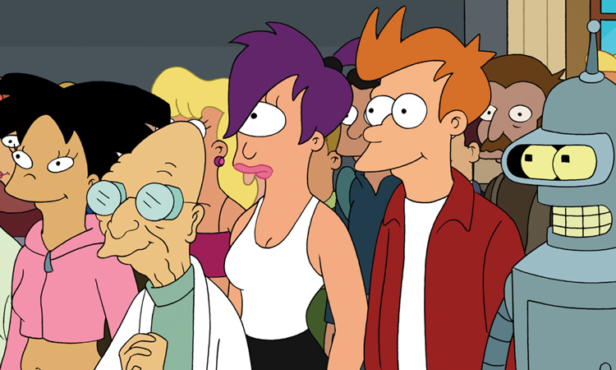“I wanted to see if I could do it again,” says Futurama creator Matt Groening, recalling the origin story of his space-age adventure show when we speak to him 21 years after its debut. “I’d had this incredible fluke of a success with The Simpsons and I wanted to see if I could collaborate with a bunch of people and try to repeat that success – which didn’t quite happen that way.”
Back in 1999, Groening and Futurama co-developer David X Cohen were about to embark on a trip to the year 3000, introducing us to 20th century remnant Fry, plucky cyclops Leela, boozy robot Bender and the rest of the Planet Express misfits. Little did they know, that’d be the easy part. Following up Groening’s ground-breaking Springfield-set series and giving Fox the new animated classic they longed for would prove a tad trickier. It was a task that would send Futurama through seven series, two cancellations, four made-for-TV movies and a podcast special – but lucky for Groening and his crew, no matter where Futurama went, its loyal fans followed.
“I’ve loved science fiction since I was a kid,” Groening tells SciFiNow, detailing the show’s creation. “I had assembled ideas on my own for a couple of years, revisiting my favourite science fiction novels and making lists of tropes and ideas that I wanted to do if I ever had a show.”
For Cohen, the prospect of helping to create a Simpsons-esque world-of-tomorrow was a dream come true – and as the resident sci-fi nerd in The Simpsons’ writers room, he was a natural choice when Groening was selecting a development partner. “A rumour went around that Matt was working on a new show – and possibly a science fiction show. Of course I became excited when I heard that,” recalls Cohen. “We began meeting once or twice a week to talk about all the sci-fi stories we loved and would love to rip-off! It really evolved slowly over a year or two before we went into Fox to pitch the idea.”
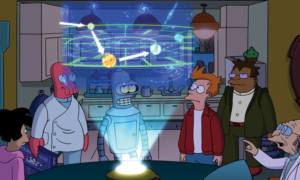
With his development partner secured and Fox onboard, Groening and Cohen went about bringing their world to life. First stop: assembling the Planet Express crew. “It was an intuitive development,” says Groening looking back “We knew we wanted to have a group of misfits who worked together. I wanted to do a show set in a future which wasn’t a military situation. Almost all science fiction we watched posited a fascist military future in which people willingly followed orders and wore uniforms. I thought, hey – it doesn’t have to be that way. It could be more fun to do something different.”
Another key factor? Avoiding inevitable comparisons: “We worked hard to differentiate the subject matter of the show from The Simpsons,” admits Cohen. “In The Simpsons we had parents and children being the two main demographics so we decided to make Futurama about 20-somethings who all work together because that was the ground The Simpsons didn’t cover very much,” he adds.
“What was expected from Fox was that we were going to do another family sitcom, just set in the future,” says Groening. “The executives were disappointed that it wasn’t like The Jetsons.”
Revisiting the show in 2019, it’s hard to imagine the Planet Express crew as anything but fully formed – but crafting Futurama’s characters was no simple task. “We thought the audience needed a representative in the future, that’s why it was the classic ‘sleeper awakes’ plot from HG Wells,” reveals Groening on the thinking behind Fry. “I like Fry as a character but it turns out he wasn’t necessary. The audience were completely on board with wherever we took them.”
“Matt already had some rough ideas for Fry, Leela, Zapp Brannigan and Kif and we fleshed out the rest of the world around them,” adds Cohen. “Bender was a major discussion because we both agreed we had to have a robot character but it was unclear what that character should be like. Most role models for robot characters were monotone and emotionless, so gradually we came up with this alternative which was the exact opposite – a robot with too many emotions and too many human traits.”
Groening remembers the moment Bender found his voice: “John DiMaggio came in and picked up on the idea that when Bender didn’t drink, he got drunk and played him as this belligerent drunk,” he laughs, “that made us laugh so hard we almost fell down. He was the obvious choice for Bender.”
Well, almost: “DiMaggio auditioned for the Professor using that crazy voice that became Bender’s,” reveals Cohen. “Someone suggested we try it for Bender instead and it all fell into place. It conveyed the character traits we were talking about.”
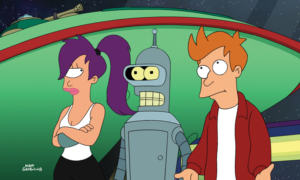
That’s humans and robots covered – but what about disgusting talking space lobsters? “David came up with the idea of Zoidberg – an alien doctor with no understanding of human anatomy,” smiles Groening.
“The inspiration for Dr Zoidberg started with Dr McCoy in Star Trek,” says Cohen. “I always thought if I was Mr Spock, I wouldn’t want a doctor of another species operating on me. Then we started adding more upsetting character traits, like he’s a bad doctor but he’s also broke, smelly and lonely,” he laughs.
“Billy West came in did that voice,” Groening adds, “which is a combination of a bunch of old character actors and it made people laugh so hard. That’s the brilliance of Billy.”
Not only did iconic voice artist Billy West bring the majority of Futurama’s colourful cast to life but he was also called upon to rescue a soon-to-be cult favourite character when tragedy struck. “Phil Hartman was on The Simpsons and he’s an actor who can make any line he says funny,” says Groening, candidly recalling how the voice behind Springfield’s Lionel Hutz and Troy McClure was due step into the boots of crass captain Zapp Brannigan before he was murdered in 1998. “We knew he had the part, it was written for him,” reveals Groening.
“The backstory on Zapp Brannigan is that he’s sort of like Captain Kirk but he’s really more like if William Shatner himself was in charge of the Enterprise,” says Cohen. “Given that personality, we thought Phil Hartman was going to be perfect and it was really shocking when he died. We weren’t sure how to deal with that and Billy came through for us as he always does. He gave us a slightly different version but one that ultimately worked fantastically,” he smiles. “He saved us. We gave Fry the first name of Phil as a tribute to Phil Hartman.”
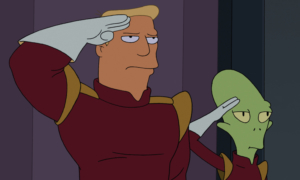
Not only did Futurama have the sharp-witted comedy chops to help it stand up against The Simpsons, it had brains too. Through Cohen and his highly educated team of writers, the show quickly made a name for itself as a series that rewarded fans of smart thinking as well as belly laughs. “I give a lot of credit to David for being meticulous with the amount of really smart ideas that are embedded in this sometimes very silly show,” says Groening. “David and his Harvard buddies all had advance degrees in mathematics and would laugh at jokes I had no idea about. I wouldn’t get the set up or the punchline. It really holds up to repeat viewing.”
Cohen lets us in on Futurama’s rules when mixing comedy and science: “One of our guiding principles was that science shall not overrule comedy,” he says. “It was a self-imposed limit on how hardcore we could go on the science. My basic philosophy was there was no limit to how nerdy and high-level the joke can be if it’s in background animation.”
Of course, there was one notable exception to Cohen’s rule. Season Six adventure ‘The Prisoner Of Benda’ saw the crew swap minds, leading Futurama’s team of writing boffins to wonder whether they could return everyone to their own bodies using nothing but good old fashioned science. “I think that’s one of Futurama’s proudest moments,” suggests Cohen. “All the characters switch bodies and nobody can switch back with the person they’ve already switched with. It wasn’t obvious to any of us whether they could all get back to their original bodies, bearing in mind there were several people in the room that had studied a lot of math, including me.”
It was writer Ken Keeler who cracked it, deducing that as long as two new people were brought into the equation who had not yet swapped bodies, group theory would return everyone to their rightful place. “That’s one of the violations of my cardinal rule,” says Cohen. “At the climax of the episode, we flash the entire proof on a chalkboard from start to finish. That’s one of my career highlights: that Futurama is probably the only show to have cut to a mathematical theorem at the climactic moment of an episode. It’s the ultimate nerd moment.”
Despite Futurama’s countless quippy one-liners, smart storylines and undeniable impact on small screen animation (would we have Rick and Morty without Bender and Fry?), Fox remained unconvinced about Groening and Cohen’s show. Its journey on television saw it endure time slot switch-ups and two cancellations before it was ultimately put to bed in 2003.
“The reaction was mixed,” remembers Groening. “I think some people just didn’t get it. Comedy and science fiction is a difficult mix to pull off and Fox really didn’t like it. In fact, they hated it so much they put it in a terrible time slot on Sunday night, which is a big night for TV in the US,” he explains. “The Simpsons comes on at 8 o’clock and they put it on at 7 – but the slogan of the network was ‘The Fun Begins At 8’,” he laughs, “so it was quite clear they were not happy with the show. It kept getting preempted and moved around and that was disappointing but we kept making episodes. We were very proud of the show, we had fanatics from the very beginning and that was good.”
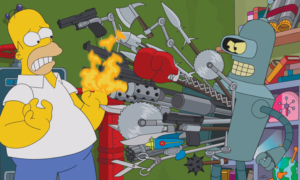
Fox’s continued confusion over the show only added to the uncertainty. In meetings, executives would give contradictory notes and insist they were promised a show like The Simpsons, to which Groening provided a now-infamous retort: Futurama was like The Simpsons – fresh and original. “They really didn’t like that,” laughs Groening.
Cohen meanwhile has his own thoughts on the show’s unlikely survival, post-Fox: “Futurama was basically saved by riding through a period of history where media kept changing. We moved from broadcast television, to cable, to DVD as that market came in and based on that being successful, we came back to Comedy Central. It was this chain reaction,” he reasons. “It got a little bit of new life each time it jumped from one delivery system to another.”
Following its four direct-to-DVD movies, Futurama secured an additional 52 episodes before the Planet Express ship finally disappeared into the sunset. Its stop-start final years marked a bittersweet conclusion but Groening and Cohen were pleased they were able to wrap things up on their own terms and in a way that rewarded the show’s loyal fanbase.
“When it first came to an end, it was really heartbreaking,” admits Cohen. “I felt like the show had really got very good and we had figured out what kind of stories to do. It was a great feeling when it came back but we were really the scrappy underdog at that point. We had to deal with a low budget and very few writers but I’m really proud of that last group of episodes so I didn’t feel super bad when it came to an end.”
Groening shares the sentiment: “Our final episode was pretty great. I’m especially pleased that the show has taken on a new life for people who didn’t see it when it was first broadcast and that it’s so beloved – that makes me really happy.” Of course, Futurama’s final official television outing was a guest appearance in Springfield. “That was surreal because in my mind Futurama is real and The Simpsons is an animated show,” laughs Groening on 2014’s crossover special ‘Simpsorama’. “It was a fun little quirk but who knows what universe that actually took place in…”
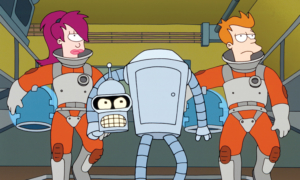
As for a potential return to the year 3000? While Groening and Cohen remain content with Futurama’s current shape, both agree that anything is possible. “The show is still definitely a huge part of my daily thinking,” reveals Groening. “If Futurama didn’t ever come back, I’d be content to do new things – however I do think we have more stories to tell and I enjoy working with the animators, writers and actors,” he adds. “I would love to do more.”
Cohen has similar thoughts regarding the future of the show: “I think there will always be more stories we can tell,” he smiles. “I feel like the Futurama universe is going along somewhere in the year 3019 and we can check in when we want – if the opportunity arises.”
